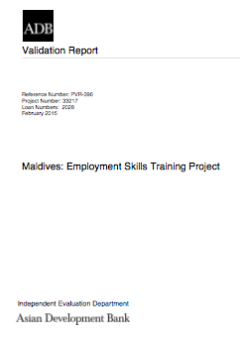
Maldives: Employment Skills Training Project (ADB validation report)
The Maldives is a small economy that relies on essentially two avenues for sustained growth—primarily the development of its human resources and, secondary, the marine and fisheries sector. The economy has been growing steadily but the supply of domestic labor has not met demand; the gap is being filled by expatriates, who are often preferred by employers as they have lower expectations for wages and working conditions in general. The supply gap for skilled and semiskilled positions is partly caused by a mismatch of skills in the Maldives' local workforce. The country has a large potential workforce of unemployable youth who, despite having completed primary education, do not continue on to further education because incentives are lacking, secondary schools are insufficient, and skills training programs are limited and of often poor quality. Consequently, the country increasingly depends on expatriate workers, depriving the Maldives' citizens the opportunity to benefit from economic growth.
Job prospects for the large group of unemployed youth depended on their undergoing skills training and qualifying for specific occupational areas of need, which would make them more productive, hence, more attractive to employers than expatriate labor. They needed access to high-quality skills training programs that offer better job prospects in expanding and attractive occupations. Hence, the project was designed to (i) provide youths with employmentoriented skills training; (ii) improve public perception of training and employment in local skillsoriented occupations; (iii) make available employment-related information to more people in the Maldives; and (iv) strengthen the capacity for labor administration and labor market analysis.
